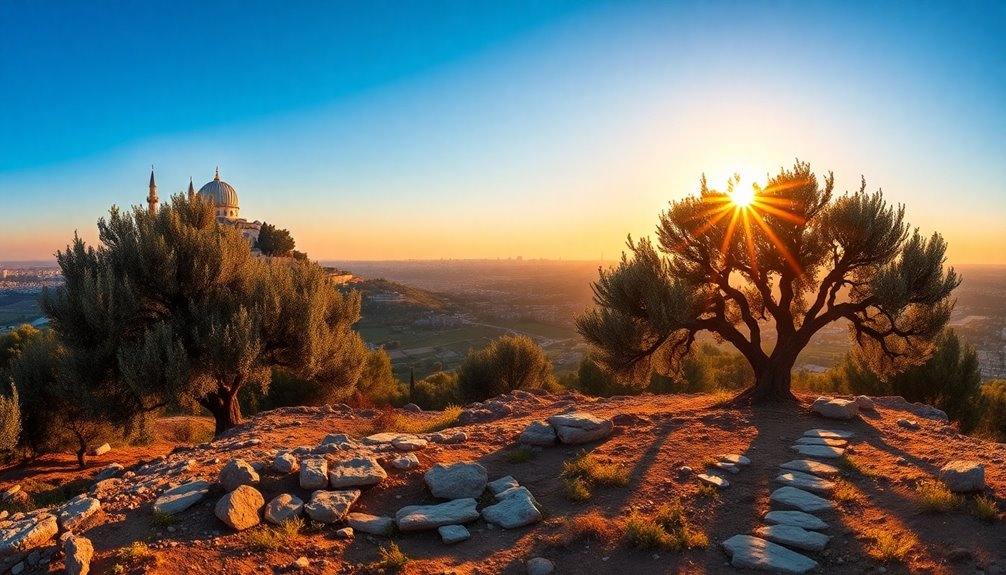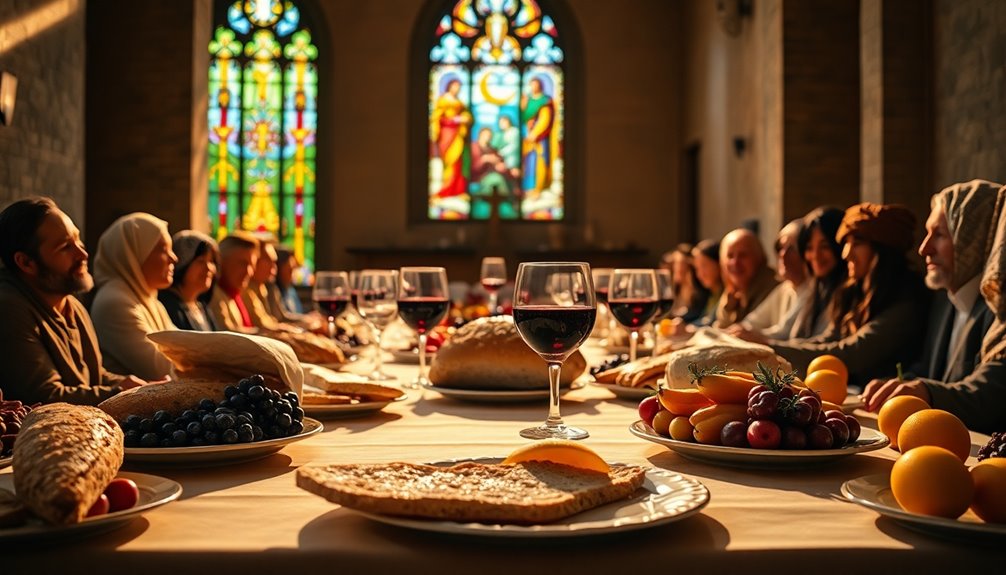The Mount of Olives, located east of Jerusalem, is steeped in historical and cultural significance for Jews, Christians, and Muslims. You'll find it mentioned in key biblical events, including Jesus' prayers in the Garden of Gethsemane and his ascension. This site has over 150,000 graves, highlighting its longstanding role in Jewish burial practices. Known for its ancient olive trees, the mount symbolizes peace and prosperity, deeply rooted in Mediterranean culture. Preservation efforts are ongoing to protect this sacred space. Stick around, and you'll uncover even more fascinating aspects of its rich heritage and significance.
Key Takeaways
- The Mount of Olives is a significant site for Judaism, Christianity, and Islam, associated with key biblical events and prophecies.
- It features over 150,000 graves and has served as a Jewish burial site for over 3,000 years.
- Jesus prayed in the Garden of Gethsemane located on the mount, and it was the site of his ascension.
- The mount hosts ancient olive trees, symbolizing peace and resilience, with cultivation dating back over 6,000 years.
- Ongoing preservation efforts aim to protect the historical and cultural heritage of the Mount of Olives after damage during Jordanian rule.
Introduction

The Mount of Olives stands as a significant landmark in Jerusalem's rich tapestry of history and spirituality. Located just east of the Old City, this prominent ridge stretches approximately 3.5 km and is integral to the city's sacred narrative. Its peaks, including At-Tur and Mount Scopus, have witnessed countless pivotal events, particularly in Judaism, Christianity, and Islam.
As you explore the Mount of Olives, you'll encounter the Garden of Gethsemane, where Jesus prayed and wept over Jerusalem, highlighting its emotional significance. This site is also where Jesus ascended into heaven, marking a key moment in Christian belief.
With over 150,000 graves on its southern slope, the Mount has served as a continuous Jewish burial site for over 3,000 years, further enriching its cultural and spiritual importance.
Despite its historical value, the Mount of Olives has faced challenges, including damage from conflicts, particularly during Jordanian rule from 1948 to 1967.
Today, ongoing preservation efforts aim to protect this sacred space, ensuring its significance endures for future generations.
Biblical Verses on Olives
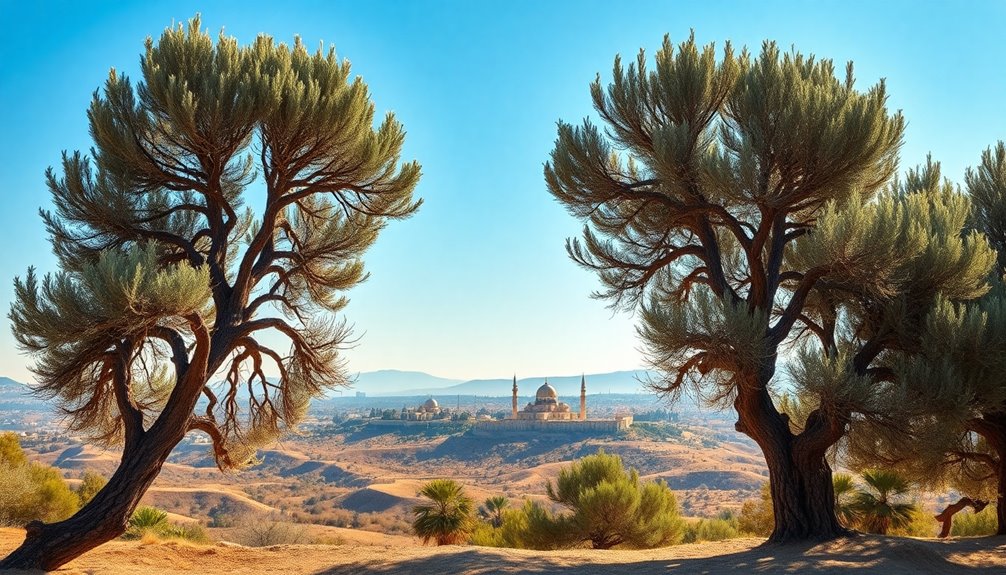
When you explore the biblical verses on olives, you'll find that they carry profound meanings of peace and divine promise.
Key references highlight the significance of the Mount of Olives and its role in pivotal events, like Jesus' prayers and ascension.
Let's look at both the primary and secondary verses that illustrate these themes.
Primary Bible References
Throughout the Bible, the Mount of Olives stands out as a significant location, steeped in history and prophecy. In 2 Samuel 15:30, you see King David fleeing over the Mount during Absalom's rebellion, marking its historical importance.
Fast forward to the New Testament, and you find Jesus' triumphal entry into Jerusalem, as recorded in Matthew 21:1 and Mark 11:1, where he approaches from the Mount of Olives. This establishes the mount's role in pivotal events.
During the Olivet Discourse in Matthew 24:3, Jesus shares profound teachings about the signs of the end times while situated on the mount, further solidifying its significance.
Zechariah 14:4 adds a prophetic layer, stating that the Mount of Olives will split in two at the Lord's coming, which foretells future events tied to this sacred space.
Finally, Acts 1:9-12 recounts the moment Jesus ascended into heaven from the Mount of Olives, emphasizing its importance in Christian beliefs surrounding resurrection and the second coming.
The Mount of Olives, east of Jerusalem, remains a cornerstone of biblical narrative and prophecy.
Secondary Bible References
In addition to its historical and prophetic significance, the Mount of Olives is also deeply connected to various biblical references regarding olives themselves. Throughout Scripture, olives symbolize peace and prosperity. In Genesis 8:11, a dove returns to Noah with an olive leaf, signifying the end of the flood. Psalm 52:8 compares the righteous to flourishing olive trees, emphasizing spiritual vitality in the house of God.
The olive tree serves as a powerful metaphor in the New Testament, particularly in Romans 11:17-24, where Paul describes Gentiles being grafted into the "olive tree" of Israel, representing God's covenant people.
Furthermore, Zechariah 4:11-14 introduces two olive trees standing beside the Lord, symbolizing the anointing and empowerment of chosen leaders.
The Mount of Olives itself is also linked to prophetic events. Zechariah 14:4 foretells that the Lord will stand on the Mount of Olives during the final battle, underscoring its significance in Jerusalem's eschatology.
These references highlight how olives and their trees are woven throughout biblical narratives, reflecting their importance in both spiritual and prophetic contexts.
Olive Cultivation in Ancient Israel
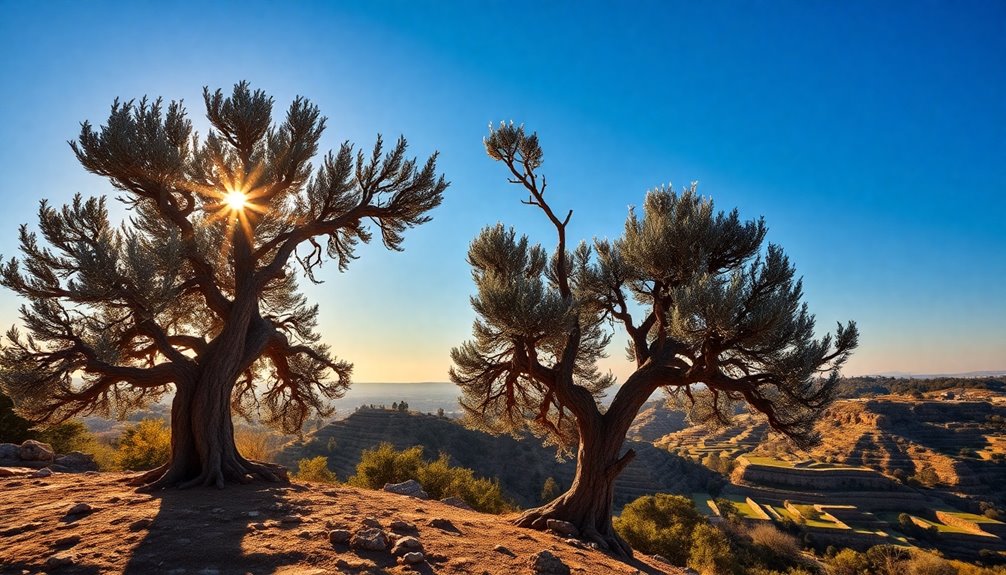
Dating back over 3,000 years, olive cultivation in ancient Israel was integral to the region's agricultural landscape. The adaptability of the olive tree to the Mediterranean climate made it a staple crop, and its oil became a vital agricultural product.
You'd find olive oil used for cooking, lighting, anointing, and in religious rituals, emphasizing its significance in daily life.
Farmers employed various techniques for olive cultivation, such as careful pruning and harvesting, along with terracing in hilly areas to maximize yield and prevent soil erosion. These methods allowed for a thriving olive oil industry, with archaeological evidence showing large-scale oil presses during the Iron Age.
Olives and their oil weren't just practical; they also held deep cultural meaning. Biblical texts frequently mention olives, symbolizing peace, prosperity, and divine blessing in ancient Israelite society.
This connection between the olive tree and spiritual significance further highlights its role in the fabric of ancient Israel's culture and economy. By appreciating these practices, you gain insight into how olive cultivation shaped the lives of those in ancient Israel.
Cultural Symbolism of Olives
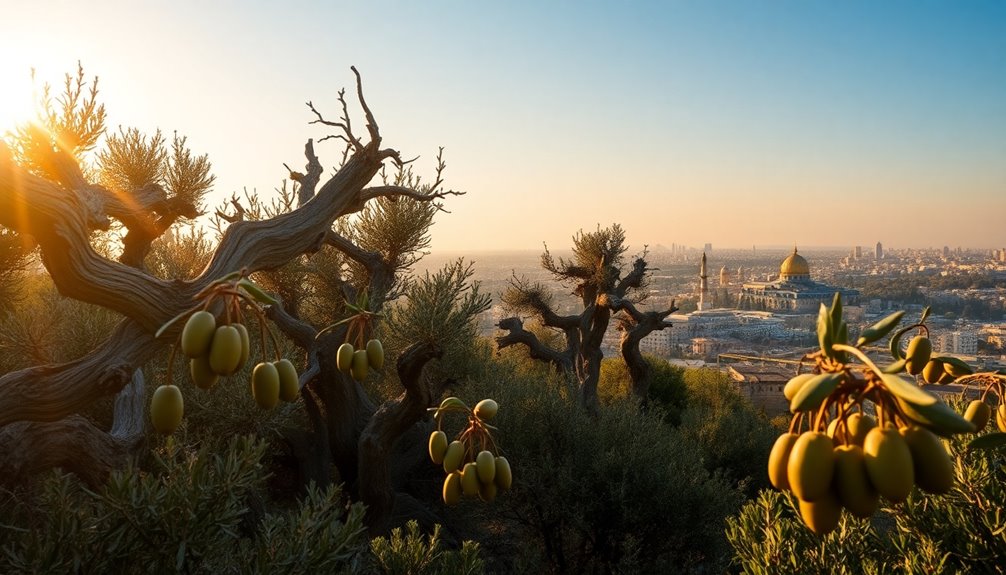
Olives have long been more than just a vital agricultural product; they carry profound cultural symbolism deeply rooted in Mediterranean society. You'll find that olives symbolize peace and tranquility, often represented by the biblical "olive branch," a universal sign of goodwill and reconciliation. The Mount of Olives stands as a testament to this, with its groves reflecting spiritual growth and hope.
As you explore their significance, you'll notice that the olive tree embodies longevity and resilience, symbolizing prosperity and nourishment for communities that depend on olive cultivation.
Olives are woven into religious traditions, with numerous references in both the Old Testament and the New Testament, emphasizing their role in rituals, sacrifices, and blessings. The Hopi Tribe also recognizes the importance of agriculture and the connection to the land in their cultural practices.
The oil extracted from these olives isn't merely for culinary delights; it holds cultural weight in anointing ceremonies, where it symbolizes holiness and divine favor.
This sacred connection enhances the overall significance of olives, making them more than just a fruit; they're a bridge between humanity and the divine, enriching the cultural landscape of the Mediterranean and beyond.
Olive Trees' Lifespan Misconceptions
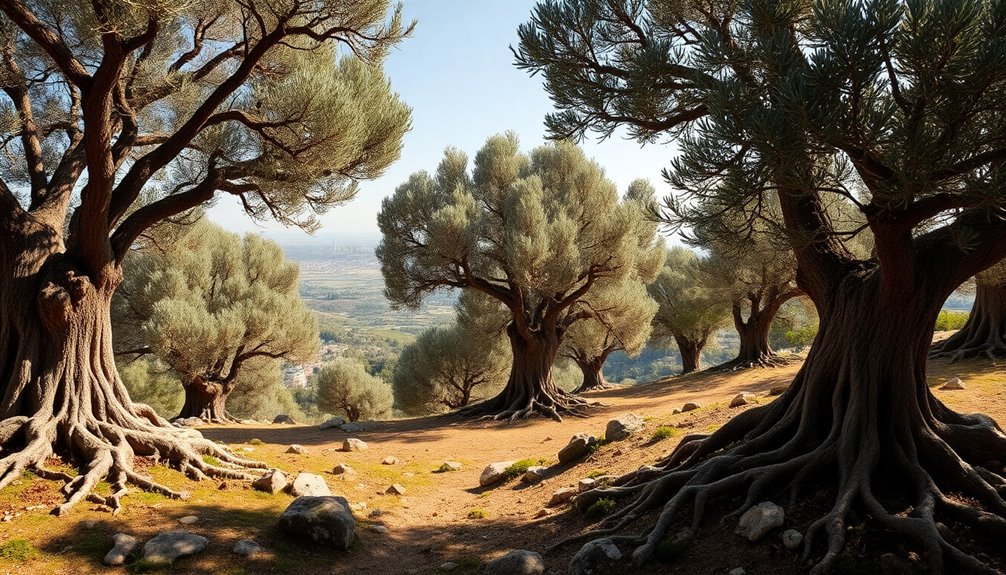
You might think olive trees have a short lifespan, but that's far from the truth.
Many of these trees can live for hundreds, even thousands of years, challenging common beliefs about their longevity.
Understanding their resilience and the conditions they need can change how you view these ancient giants.
Debunk Olive Tree Longevity
Many people romanticize the idea of olive trees living for thousands of years, but the reality is quite different. While the Mount of Olives boasts ancient olive trees, most cultivated varieties typically live between 300 to 600 years under optimal conditions. The oldest known olive tree in Crete may be around 2,000 to 3,000 years old, but that's an exception rather than the rule.
Factors like soil quality, climate, and care practices significantly influence an olive tree's lifespan. Healthy trees, nurtured in the right environment, have a better chance of thriving longer.
However, the ancient olive trees you see in places like the Mount of Olives have often been replanted or replaced over centuries due to environmental stress and human activity.
The misconception about olive trees' longevity likely stems from their ability to endure harsh conditions and their historical significance. Yet, it's essential to recognize that actual lifespans vary widely based on numerous factors.
Alternative Interpretations of Longevity
The allure of ancient olive trees often leads to inflated beliefs about their lifespans. While some olive trees are indeed estimated to be over 2,000 years old, this doesn't reflect the average longevity you'll find across the globe.
Most olive trees enjoy a productive lifespan of only 30 to 150 years. After that, their yields significantly decline, challenging the idea that age alone guarantees longevity.
Factors like soil quality and climate play crucial roles in determining how long olive trees can thrive. If the soil isn't nutrient-rich or the climate isn't suitable, even the hardiest trees won't reach impressive ages.
Furthermore, many olive trees are cultivated for commercial purposes, meaning they're often replaced after just a few decades to maximize yield.
Culinary Uses of Olives

When you think of olives, you might picture the rich flavor of homemade olive oil.
You can easily join community olive oil workshops to learn how to produce your own, enhancing your cooking with fresh, high-quality oil.
Plus, experimenting with different olive varieties lets you discover unique tastes that elevate your favorite dishes.
Home Olive Oil Production
Home olive oil production brings the rich flavors and health benefits of the Mount of Olives right to your kitchen. Imagine having high-quality extra virgin olive oil derived from ancient olive trees, some over 1,000 years old, just a few steps away.
By using traditional cold pressing methods, you can preserve the oil's nutrients and vibrant flavor, making it perfect for enhancing your culinary creations.
This olive oil is a staple in Mediterranean dishes, elevating simple salads, marinades, and cooked meals with its fruity and slightly peppery notes. When you drizzle your homemade olive oil over pasta or mix it into dressings, you not only enrich the taste but also benefit from its anti-inflammatory properties and heart health advantages.
With its high content of monounsaturated fats and antioxidants, olive oil from the Mount of Olives becomes more than just an ingredient; it's a healthful addition to your diet.
Taking the plunge into home olive oil production allows you to connect with the ancient traditions of the Mount of Olives while enjoying a delicious and nutritious product.
Embrace this culinary adventure and savor the unique flavors your own olive oil can bring!
Community Olive Oil Workshops
Exploring community olive oil workshops offers a fantastic opportunity to deepen your understanding of the culinary uses of olives. You'll learn how to select the right olives and incorporate them into various dishes, enhancing flavor and nutrition.
These workshops often discuss the distinct profiles of green and black varieties, helping you appreciate how they can transform your cooking. Health benefits are another key focus. You'll discover how olive oil, rich in monounsaturated fats and antioxidants, can contribute to heart health and overall wellness.
Engaging in olive oil tasting sessions allows you to compare oils from different regions and production methods, developing your palate and understanding of quality. Additionally, many workshops showcase traditional Mediterranean recipes, featuring olives in salads, tapenades, and marinades.
You'll see just how versatile olives can be, not only in enhancing taste but also in elevating the presentation of your dishes. By the end of the workshop, you'll leave with practical tips and delicious recipes, ready to incorporate olives into your culinary repertoire.
Enjoy the experience and the rich flavors that olives bring to your table!
Cultural Heritage of Olives
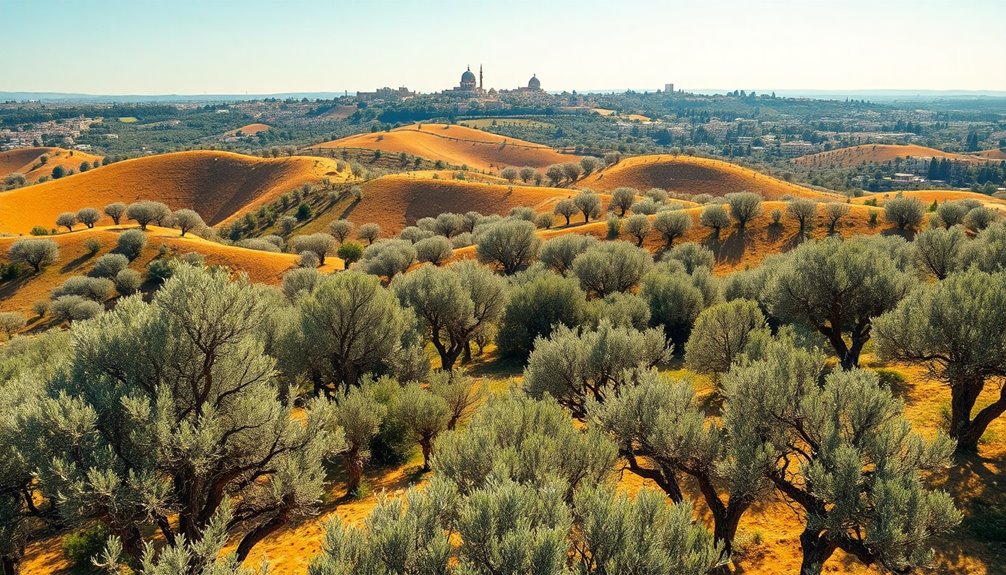
Rooted in ancient history, the cultural heritage of olives is deeply intertwined with the Mediterranean way of life.
You'll find the Mount of Olives holding ancient olive trees, some over a thousand years old, symbolizing longevity and resilience. These trees are more than just plants; they represent the enduring nature of olive cultivation in the region. For thousands of years, olives have been cultivated, with archaeological evidence tracing their domestication to around 6,000 years ago in areas like the Levant.
In Mediterranean culture, olives aren't just a food source; they embody peace and prosperity. Olive oil, derived from these fruits, plays a vital role in religious rituals and culinary practices, highlighting its cultural significance across civilizations.
You might recall biblical narratives, where the olive tree serves as a symbol of hope and renewal, such as the dove returning to Noah with an olive branch. This connection enhances the olive's spiritual importance throughout history.
As you explore the Mount of Olives, you engage with a legacy that celebrates not just the fruit, but the profound cultural ties that bind it to the Mediterranean way of life.
Additional Resources

For those seeking to deepen their understanding of the Mount of Olives, a variety of resources are available to enhance your experience. Start with guidebooks that detail the area's rich history, including its approximately 150,000 graves, making it one of the oldest and largest Jewish burial sites.
You'll find significant landmarks like the Church of All Nations, built over the rock where Jesus prayed before his crucifixion, and the Dome of the Ascension, which marks the site of Jesus' ascension into heaven.
Consider joining guided tours that focus on the various significant events tied to this sacred ground, such as King David's flight from Absalom and Jesus' triumphal entry into Jerusalem. Many visitors also appreciate the stories shared during these tours, providing deeper insights into the burial sites and their meaning.
Don't overlook the wealth of information from archaeological studies that explore ancient burial practices and ongoing preservation efforts.
As a pilgrimage destination for Christians, Jews, and Muslims, the Mount of Olives offers a unique blend of spirituality and history, making it a must-visit for anyone interested in its profound significance.
Frequently Asked Questions
What Is the Biblical Significance of the Mount of Olives?
The biblical significance of certain locations often ties back to pivotal events and teachings.
You'll find that places where Jesus delivered profound messages or prayed deeply hold great meaning. For instance, moments like his anguished prayers and prophetic discussions shape the understanding of faith and future events.
These sites symbolize divine encounters and the promise of redemption, serving as reminders of God's presence and the unfolding plan through scripture.
What Is so Special About Mount of Olives?
The Mount of Olives is special for several reasons. Its breathtaking views of Jerusalem captivate visitors, while its rich history resonates deeply with those interested in spirituality.
You'll find significant landmarks, like the Garden of Gethsemane, where pivotal biblical events occurred. Additionally, its status as a major burial site highlights its cultural importance.
People from diverse faiths visit, drawn by the site's profound religious connections and historical legacy.
Does the Mount of Olives Still Exist?
Yes, it still exists today as a prominent and significant geographic feature. Rising over 800 meters above sea level, you'll find it in East Jerusalem.
This location holds immense historical, religious, and cultural importance for many. With around 150,000 graves, it serves as a major burial site and attracts countless pilgrims and tourists.
Despite facing challenges, ongoing efforts ensure its preservation for future generations, allowing you to experience its rich legacy.
Is the Mount of Olives the Same as Gethsemane?
No, Gethsemane isn't the same as the Mount of Olives, but they're closely linked.
Gethsemane is actually a garden located at the foot of the western slope of the Mount of Olives.
While the Mount of Olives is a broader area with historical and religious significance, Gethsemane specifically refers to the site where Jesus prayed before his arrest.

